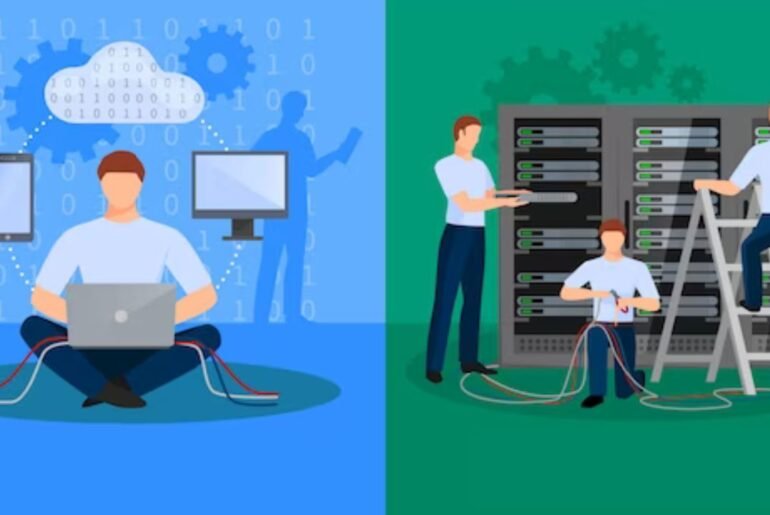"Ready to Take Control? Explore Self-Managed VPS Hosting!"
Self-managed VPS hosting, a popular choice among website owners and businesses, has a number of benefits that can significantly enhance your online presence. In this article, we will explain self-managed VPS hosting and provide useful tips on how to make the most of it.
Understanding Self-Managed VPS hosting
Self-managed VPS (virtual private server) hosting is a hosting option that gives users their own virtual server within a bigger physical server. Unlike fully managed VPS hosting, users are responsible for server configuration, program installation, and troubleshooting on a self-managed VPS. This option is suitable for people or businesses with technical expertise that prefer complete control over their server environment.
Pros of Self-Managed VPS
- Total Control: With a self-managed VPS, users have whole control over their server environment.
- Cost-Efficiency: It is usually more cost-effective because you manage the server yourself, minimizing operational costs.
- Learning Opportunity: It's an excellent choice for technology expert individuals who want to gain hands-on experience in server management
Cons of Self-Managed VPS
- Technical Knowledge Required: Managing your VPS requires technical knowledge, which can be difficult for beginners.
- Time-consuming: Routine maintenance and troubleshooting can be time-consuming, diverting your attention away from other important duties.
- Limited Support: You'll be responsible for resolving issues and security concerns.
Setting Up a Self-Managed VPS
Now Let’s come to know how to set up and manage it effectively.
Choosing a Reliable Hosting Provider
The first step is to find a reliable hosting company that provides self-managed VPS hosting services. Look for companies with a proven track record, outstanding customer service, and straightforward pricing structures. Check that they provide the operating system and resources you require.
Installing the Operating System
After selecting a hosting provider, you must install the operating system on your VPS. The majority of providers provide a selection of popular operating systems, such as Linux distributions or Windows Server. Choose the one that best meets your requirements and follow the installation instructions provided by the provider.
Managing Server Settings
After the operating system has been installed, the server settings must be setup. Setting up server users, rights, and software applications is part of this. Take your time fine-tuning these settings to match the exact requirements of your website.
Managing Your Self-Managed VPS

Regular Maintenance and Updates
Maintaining your server on a regular basis will keep it in good repair. Applying software updates, monitoring server performance, and optimizing server resources are all part of this. Regular maintenance ensures that your virtual private server runs smoothly and safely.
Troubleshooting Common Issues
As self -managed VPS hosting gives you greater control, it also means you must deal with any issues that emerge. Familiarize yourself with typical server issues and learn how to properly troubleshoot them. Online groups and resources can be quite helpful in locating solutions to specific situations.
Backups and Data Security
Data loss is every website owner’s worst fear. To preserve your data, implement a solid backup system. Back up your website and server settings on a regular basis, and keep backups in a secure area. In the event of an unexpected disaster, this precaution could save your life.
Self Managed vs. Managed VPS Hosting
Self Managed
Self-managed VPS hosting requires you to manage the server, making it suitable for people who desire complete control and customization.
Managed VPS Hosting
Managed VPS hosting includes a team of experts who will manage your server for you. This is a good option if you prefer to concentrate on the content and operation of your website while leaving technical responsibilities to the hosting provider.
Security Measures for Self-Managed VPS
Implementing Firewall and Security Software
Install security software and set up a firewall to regulate incoming and outgoing traffic on your server. To stay ahead of potential risks, keep these tools up to date.
Self-Managed VPS Hosting for E-Commerce Websites
E-commerce websites have specific hosting requirements, and self-managed VPS hosting can successfully meet these requirements.
Self-managed VPS hosting gives you the resources and control that you need to create a successful e-commerce website. You may speed up transactions by optimizing the server, implementing security steps to protect client data, and scaling resources during peak shopping seasons.
Self-Managed VPS Hosting for Developers
Developers can create a customized environment for their work using self-managed VPS hosting. In a controlled environment, you can install specific software, build up development frameworks, and test apps. The ability to modify your server environment allows developers to experiment and create. Self-managed VPS hosting is great for developers who desire complete control over their development operations.
Self-Managed VPS Hosting for WordPress
WordPress users can use self-managed VPS hosting to improve their websites. Configure your VPS to match the precise requirements of your WordPress site. You can easily install WordPress and use plugins to improve functionality and performance.
Conclusion
Finally , for individuals that desire complete control over their hosting environment, self-managed VPS hosting is an excellent option. It provides benefits such as improved performance, security, and cost-effectiveness. Whether you’re an e-commerce company, a developer, or the owner of a small website, self-managed VPS hosting can help you take your online presence to the next level.
When deciding between self-managed and managed VPS hosting, consider your technical expertise and hosting requirements. You can enjoy the benefits of this hosting choice with an appropriate mindset and a commitment to continuing maintenance.





